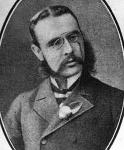William Astley was born in Liverpool, England, in 1855, the second son of Thomas Astley, a watchmaker, and his wife Mary Elizabeth (nee Price). The family migrated to Melbourne in 1859, and William was educated at St. Stephens School, Richmond and the Model School in Carlton. After employment in the book trade, he commenced his career as a journalist in 1875 as editor of the Richmond Guardian. For the next fifteen years he was employed on regional newspapers throughout New South Wales, Victoria and Tasmania. In 1891 he settled in Sydney and within two years was recognised as a leading radical journalist and short-story writer.
'Warung' worked for the Bulletin as one of its most prolific writers of short stories and political commentary. He adopted the pseudonym of 'Price Warung', combining his mother's maiden name and the Aboriginal name for Sydney. Four series of his convict tales were published in the Bulletin between 1890 and 1893: Tales of the Convict System (1892), Tales of the Early Days (1894, Tales of the Old Regime and The Bullet of the Fated Ten (1897). The first was dedicated to 'the memory of Marcus Clarke.' Colin Roderick notes that 'Warung' continued Clarke's work in 'recounting stories drawn from the records of the convict system.' 'Warung' claimed his stories were 'true in essence,' and Roderick adds that the writer 'looked into the prison records with any eye made sharp by the power of human sympathy.' Tales of the Isle of Death, Norfolk Island appeared in 1898, and then came a collection based on life along the Murray River and its affluents, Half Crown Bob and Tales of the Riverine (1898).
'Warung' later devoted himself to the Labour and Federation movements, playing an important part in the politics of the new nation. In 1893 he severed relations with the Bulletin after a series of disputes and became editor of the Australian Workman which published part of his uncompleted novel, 'The Strike of '95'. His article, 'Labor in Politics: The Conference of November 1893. A Criticism and an Appeal' from the newspaper was reprinted as a pamphlet. 'Warung' resigned from the newspaper in November 1893 due to ill health and remained a freelance writer for the rest of his career. In 1896 he was organising secretary of the Bathurst People's Federal Convention which was intended to educate the man in the street and demonstrate popular support for federation. It was a huge success and 'Warung' became a zealous advocate for the cause. He also wrote Bathurst, the Ideal Federal Capital (1901).
'Warung' continued to research Australian history but wrote little after 1897 as ill health and failed business ventures dogged him. His last commissioned series of stories was 'Tales of the Isle of Death' for John Norton's Truth in 1897. In later life 'Warung' reportedly suffered from a degenerative spinal condition linked to tertiary syphilis which, combined with addiction to morphia, led to physical deterioration and a collapse of his writing career. He lived as a recluse and in 1908 received a small pension from the newly inaugurated Commonwealth Literary Fund. 'Price Warung' died at Rookwood Benevolent Asylum in 1911.
